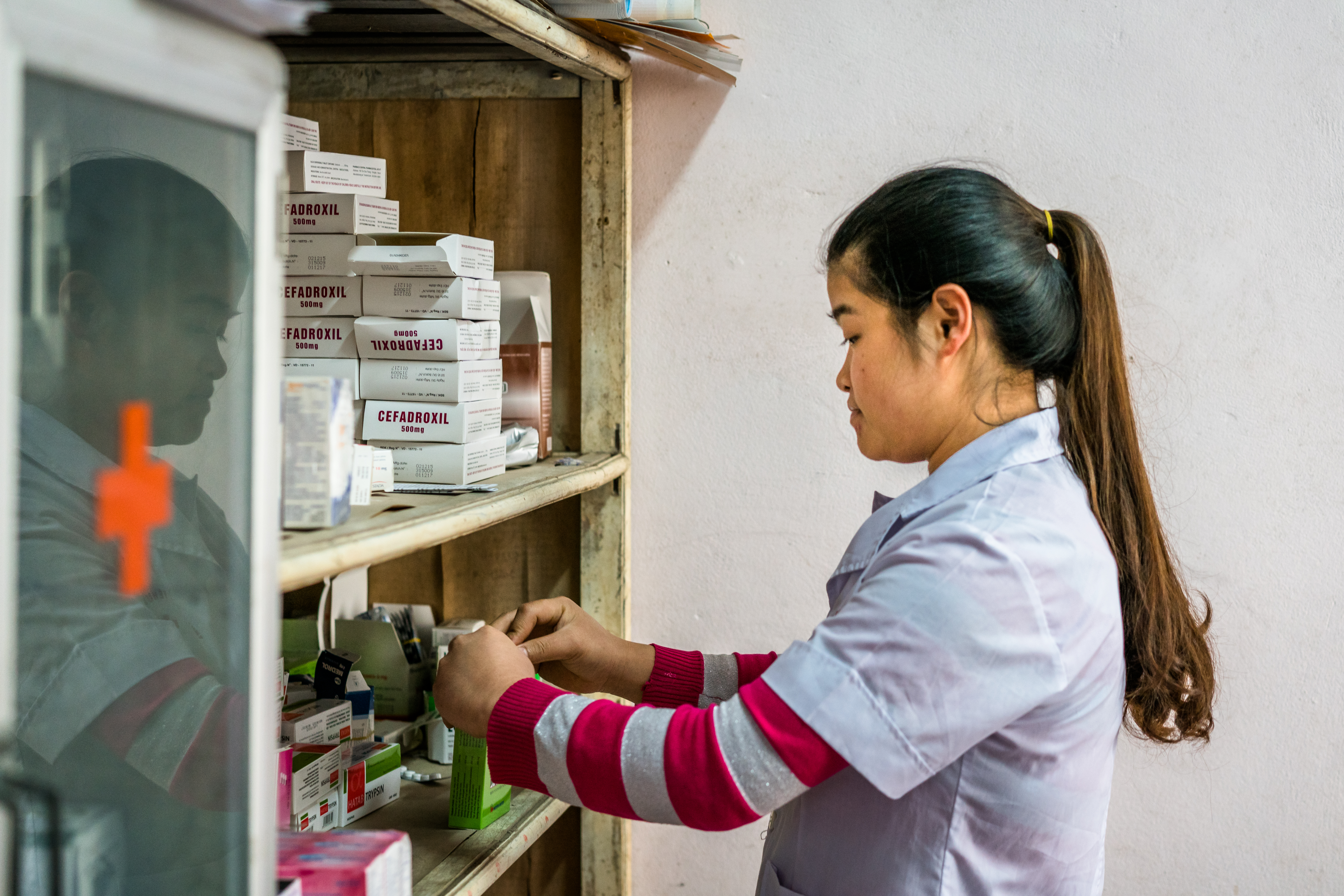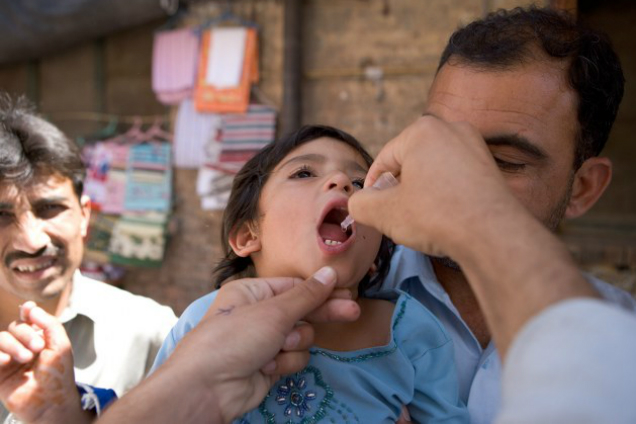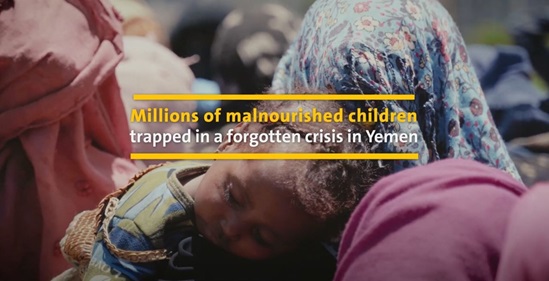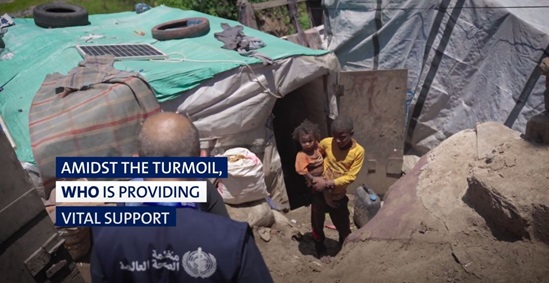
Kingdom of Saudi Arabia
Partner in global health
This content was last updated on 13 August 2024
The strategic partnership with The Kingdom of Saudi Arabia
The World Health Organization and the Kingdom of Saudi Arabia have a strong, long-standing strategic partnership that has spanned over 6 decades. The country continues to be amongst the top 20 overall contributors to the WHO. This multi-faceted and innovative partnership includes collaboration on capacity building initiatives, technical collaboration, advocacy and resource mobilization for global health projects and programmes. As a key WHO partner, the Kingdom of Saudi Arabia has a proven track record in advocating for life-saving global health initiatives and works with the Organization to reach their common goal to achieve the Sustainable Development Goals (SDGs).
In August 2024, the Kingdom of Saudi Arabia and WHO convened their first Strategic Dialogue, building on their successful partnership and their commitment to working jointly to address global health challenges. The overall objective of the strategic dialogue was to create a platform to discuss current and potential areas of collaboration and interest with WHO leadership and technical experts on WHO programmes and policies. The meeting included high-level representatives from the Government of Saudi Arabia including H.E. Mr Fahad bin Abdurrahman Al-Jalajel, Minister of Health, amongst others.
WHO works in close collaboration with the following entities in the Kingdom of Saudi Arabia:
- Ministry of Health
- Ministry of Foreign Affairs
- King Salman Humanitarian Aid and Relief Centre
- Saudi Development Fund
- Saudi Patient Safety Centre
- Saudi Food and Drug Authority
- Saudi Sports for All Federation
- Ministry of Finance
- Public Health Authority
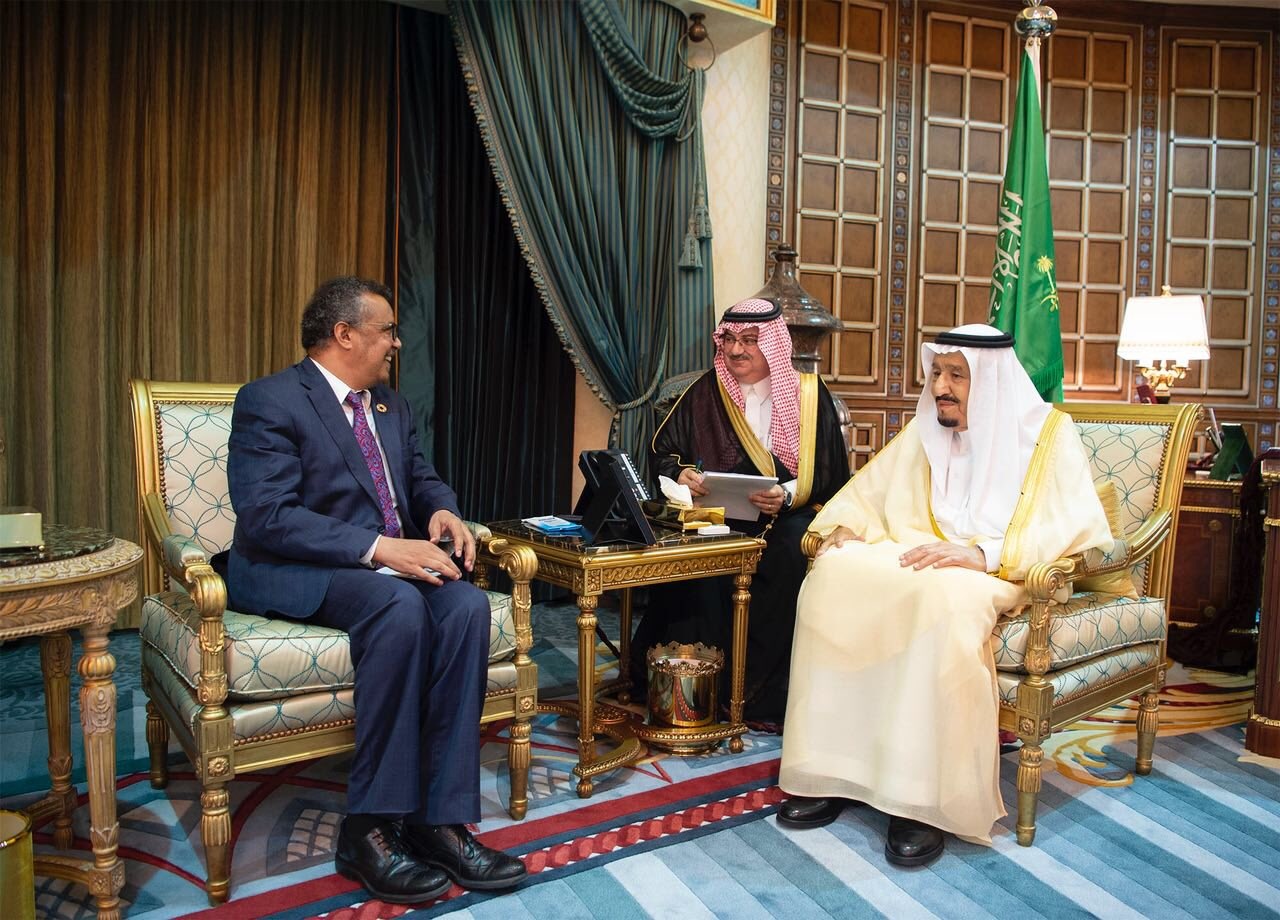
Dr Tedros met with His Majesty King Salman to discuss WHO-KSA cooperation and its important contributions to global health through support to polio eradication & emergencies
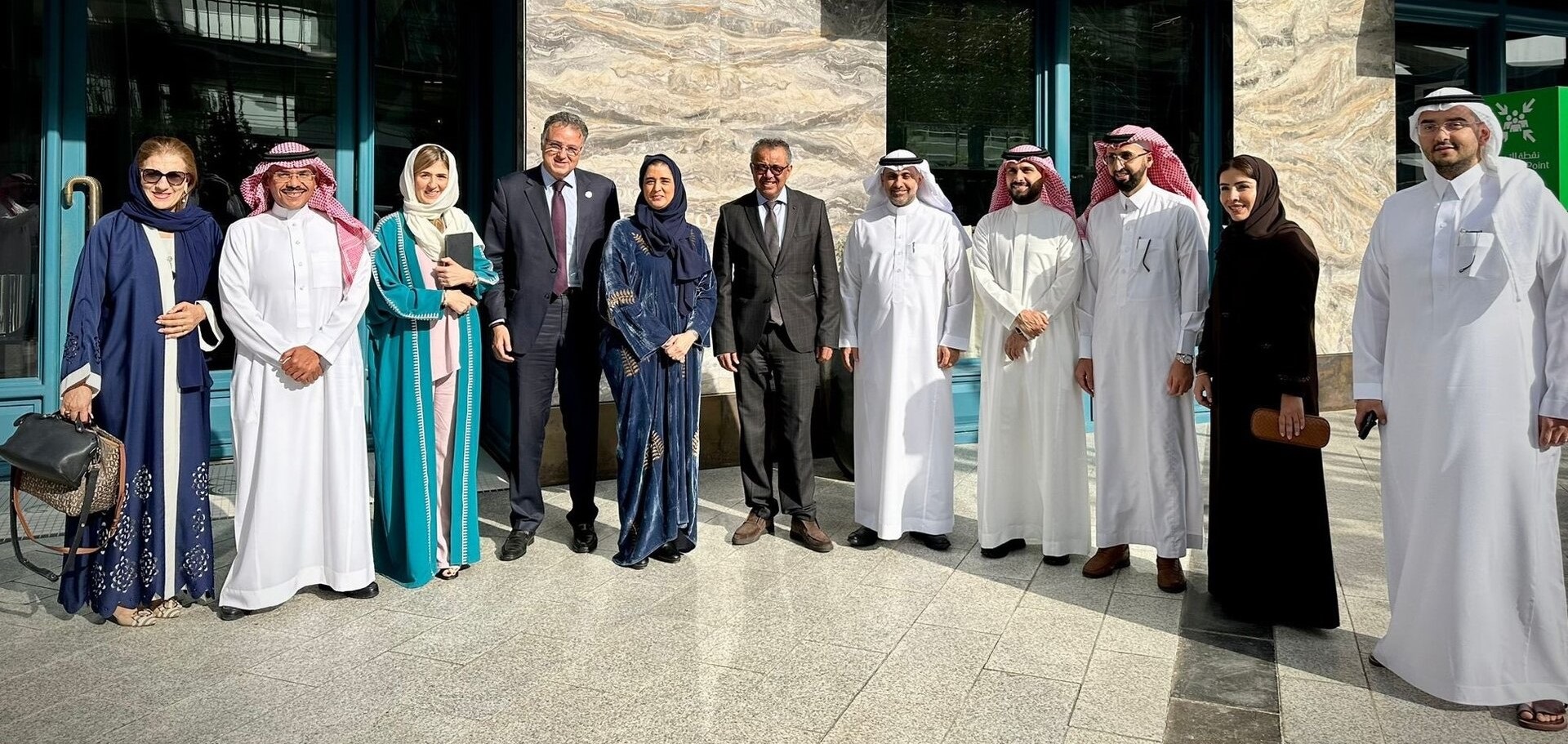
Dr Tedros visited the Kingdom of Saudi Arabia in April 2024 and received a warm welcome by Health Minister Fahad bin Abdurrahman Al-Jalajel
Kingdom of Saudi Arabia: A top WHO donor
Since 2018, Saudi Arabia has consistently supported WHO and contributed over US$ 385 million to global health initiatives and emergency-related operations in various countries including the occupied Palestinian territory (oPt), Ukraine, Bangladesh, Iraq, Somalia, Syria and Yemen, amongst others. Moreover,
the Kingdom has been amongst WHO’s Top 20 donors over the past three consecutive biennia, and was the fourth largest contributor of thematic funds for the 2022-2023 biennium.
The level of funding from Kingdom of Saudi Arabia continues to increase, with a focus on partnering with WHO on emergencies.
More about the support of the Kingdom of Saudi Arabia to WHO is available in the programme budget portal.

Note: The amounts represent the revenue received by WHO for the period stated and they might differ from the figures in the WHO Budget Portal, as they represent funds available net of programme support costs
Top priorities
- Hajj pilgrimage – Mass Gatherings
- Polio eradication
- Health emergencies:
- Overview of Humanitarian collaborations
- COVID-19 Global Response
- Response to Rohingya crisis
- Middle East Respiratory Syndrome (MERS)
- Antimicrobial resistance (AMR)
- Data Analytics and Delivery for Impact (DDI)
Hajj Pilgrimage – Mass Gatherings
The Kingdom of Saudi Arabia is home to the annual Hajj pilgrimage performed by millions of Muslims from around the world; it presents a major public health priority for both the Kingdom and the international community. Over the years, Saudi Arabia has put in place many healthcare services for pilgrims to keep the Hajj season free from infectious and epidemic diseases, and the Kingdom and WHO have forged a strategic partnership on the development of health measures for the Pilgrimage.
Polio eradication
In 2024, the Kingdom of Saudi Arabia has pledged US$ 500 million over five years to support the work of the Global Polio Eradication Initiative (GPEI). This is a significant increase in funding for the global effort to eradicate polio - a devastating virus that paralyses and can be fatal for children but is preventable with vaccines. The funds will enable GPEI partners - including WHO - spearheaded by national governments, to protect more than 370 million children with polio vaccines every year. It will also facilitate the delivery of other life-saving interventions like nutritional supplements and bed nets to underserved communities and strengthen health systems to better prepare countries for emerging health threats.
Also, the Kingdom’s leadership of polio eradication efforts through the Organization of Islamic Cooperation (OIC) and the Islamic Development Bank resulted in 55 of the 57 OIC Member States becoming polio-free. The Kingdom addressed misconceptions about polio vaccines through Fatwas issued by the International Islamic Fiqh Academy (IIFA) in Jeddah, significantly increasing community trust and acceptance of vaccinations in all Muslim communities. Polio vaccination requirements were enforced for all Hajj and Umrah pilgrims from polio priority countries, thus preventing polio outbreaks.
The Kingdom had also previously provided significant funding, primarily through the Saudi Fund for Development, to polio eradication efforts. And further to the 2020 "Call to Action". The support allowed for the procurement and distribution of millions of doses of oral polio vaccine to protect tens of millions of children in the poorest countries of Africa and the Middle East (e.g. Chad, Ethiopia, Côte d'Ivoire, Kenya, Mali, Niger, Somalia, Sudan and Yemen), as well as in Afghanistan and Pakistan.
Reaching all children with lifesaving vaccines is critical to #EndPolio. I joined the @wef Special Meeting today alongside 🇵🇰 Prime Minister @CMShehbaz, 🇸🇦 Health Minister Fahad bin Abdurrahman Al-Jalajel, @KSRelief_EN Supervisor General Abdullah Al Rabeeah, and @BillGates and… https://t.co/SzT7oXWewj pic.twitter.com/fUUS9cPSP7
— Tedros Adhanom Ghebreyesus (@DrTedros) April 28, 2024
Health Emergencies
Overview of Humanitarian collaborations
KSrelief acting on behalf of the Government of Saudi Arabia is one of WHO's major donors to operations in humanitarian settings providing over US$ 379 million during the 2018-2023 period alone. Every generous contribution is a turning point and a beacon of hope for thousands of vulnerable people, including women and children.
In 2024, KSrelief provided significant funding in support of WHO operations in Gaza, occupied Palestinian territories (oPt). The support by KSrelief was aligned with WHO's operational plan with a focus on ensuring the availability of supplies and delivery of health services.
I just met with Foreign Ministers @FaisalbinFarhan, @Menlu_RI and Riad Malki, and Hissein Brahim Taha, @OIC_OCI Secretary-General, to discuss the dire health situation in #Gaza. We discussed our shared concerns over the systematic degradation of the health system.@WHO will… pic.twitter.com/igGIZYjHFN
— Tedros Adhanom Ghebreyesus (@DrTedros) December 12, 2023
Additionally in 2024, WHO and KSrelief signed 3 agreements with WHO valued at US$ 19.4 million on the sidelines of the World Health Assembly (WHA) in Geneva in support of WHO operations and programmes in Sudan, Syria, and Yemen.
In Syria, this contribution supports WHO's operation as the country continues to struggle with a protracted political and socio-economic crisis which resulted in a severe deterioration of living conditions which were only further exacerbated by the devastating consequences of the earthquake which struck last year. The earthquake caused significant destruction, claiming thousands of lives, and damaging essential infrastructure, including health facilities. This generous contribution supports the recovery efforts and ensures health services remain available to the most vulnerable people in communities.
In Sudan, the war has disrupted the Sudanese healthcare system, substantially impacted the infrastructure and caused communities to lose access to essential and renal care services. KSrelief support ensures the provisions of life-saving dialysis treatment for people living with kidney failure across Sudan.
In Yemen, since 2016, King Salman Humanitarian Aid and Relief Centre (KSrelief) and WHO worked jointly to provide humanitarian health assistance to the most vulnerable Yemenis in an urgent need of life-saving support. The ongoing crisis in Yemen has deeply affected the lives of a population already living in the most vulnerable country in the Middle East.
The conflict has left 18.2 million people in need of humanitarian assistance and protection services, while 17.6 million are facing food and nutrition insecurity. Outbreaks of vaccine-preventable diseases, such as cholera, are ongoing, affecting and straining the health system, amidst concerns of having only 60% of the health facilities fully functioning.
From 2016 to 2022, KSrelief with its generous contributions enabled WHO to reach over 52 million crisis-affected beneficiaries with access to multiple health services in 22 governorates. The services provided through this partnership have included malnutrition screening and treatment, malaria, cholera, and COVID-19 surveillance and treatment, life-saving oxygen therapy, access to safe water, and the rehabilitation and equipping of health facilities.
Thank you @KSRelief for your continued partnership and generosity. Your latest contribution of US$19.4 million for Sudan, Syria, and Yemen will boost WHO’s work and help improve health outcomes for vulnerable people. Together, we are making a tangible difference. pic.twitter.com/BiCnhXxciI
— HananBalkhyحنان بلخي (@HananBalkhy) May 26, 2024
In 2022, KSrelief partnered with WHO to further bolster polio and measles programmes in three countries. The agreement was signed on the sidelines of the World Health Summit in Berlin. The support was in response to a call for emergency action by WHO and UNICEF to avert major polio and measles epidemics. WHO and UNICEF urged countries to prioritize vaccination for children as they rebuild their immunization systems following major global immunization disruptions caused by COVID-19. The pandemic left millions of vulnerable children at heightened risk of preventable childhood diseases.
With the generous contribution from KSrelief, WHO supported the polio and measles programmes in Somalia, Iraq, and Sudan through the procurement of laboratory equipment; enhancing surveillance; digitalization of EPI; strengthening the cold chain; and trainings of campaign vaccinators.
"COVID-19 has had a devastating effect on immunization services globally," said Dr Tedros Adhanom Ghebreyesus, Director-General of WHO. "KSrelief's generous support will help WHO to save children's lives, benefiting an estimated 50 million people and averting major outbreaks of vaccine preventable diseases including polio and measles."
In 2021, WHO and KSrelief signed an agreement in support of WHO's Ukraine health emergency response in Poland. The funds were utilized in support of the immediate response efforts for Ukrainian refugees in Poland as well as towards strengthening the healthcare system, and supporting expansion efforts to provide health care to the refugees from Ukraine. Additional support from KSrelief for the Ukraine emergency response is currently under negotiation.
Shukran jazeelan Dr Abdullah Al-Rabeeh, Supervisor General of @KSRelief_EN, for your support of @WHOPoland's work to deliver vital humanitarian health support for #Ukraine refugees in #Polandhttps://t.co/VW1mjT3Dor
— Tedros Adhanom Ghebreyesus (@DrTedros) August 11, 2022
Thank you, Kingdom of #SaudiArabia, for your additional contribution of $90 million to @WHO & for helping us respond to humanitarian risks caused by the #COVID19 pandemic & strengthen our support to countries with fragile health systems. Together!https://t.co/Y7qRrq7vHd
— Tedros Adhanom Ghebreyesus (@DrTedros) October 2, 2020
COVID-19 Global Response
In 2020, as Saudi Arabia assumed the Presidency of the G20, the Custodian of the Two Holy Mosques King Salman Bin Abdulaziz Al Saud chaired the extraordinary G20 Leaders meeting where Saudi Arabia pledged US$ 500 Million in support of the Global Response to COVID-19. Through the G20 platform the Kingdom of Saudi Arabia also advocated for global solidarity and cooperation in combating the pandemic.
Over US$ 90 million was allocated to WHO in support of the implementation of the COVID-19 Strategic Preparedness and Response Plan (SPRP) as well as other key WHO programmes and activities including health in emergencies.
Response to Rohingya crisis
Strengthening the Sadar District Hospital in Cox's Bazar
In August 2017, violence in Rakhine State, Myanmar forced more than 646,000 Rohingya (Forcibly Displaced Myanmar Nationals, FDMN) across the border into Cox’s Bazar, Bangladesh, joining some 300,000 that fled in earlier waves of displacement. Pre-existing settlements and camps have expanded with the new influx, while new spontaneous settlements have also formed and are quickly growing. Significant numbers of new arrivals are also being absorbed into the local host community.
A combination of overcrowded living conditions, poor hygiene and low immunization coverage has left the FDMN population at risk for a wide range of infectious diseases, including Cholera, Measles, Rubella, and Diphtheria.
WHO and the King Salman Center for Humanitarian Relief collaborated on the renovation of Sadar hospital — the main provider of secondary health care and is the referral hospital in the Sadar district — to enhance health care delivery for the Rohingya population.
This collaboration between WHO and KSRelief drastically improved conditions of the care facility and health services delivery to patients.
Middle East Respiratory Syndrome (MERS)
Since its emergence in 2012 in the Kingdom of Saudi Arabia and Jordan, MERS-COV has continued to infect humans mainly in the Arabian Peninsula, through direct or indirect contact with dromedaries. The Middle East Respiratory Syndrome Coronavirus (MERS-COV) is widespread in dromedary camels (Camelus Dromedaries; dromedaries) in the Middle East, large parts of Africa and likely in South Asia, though surveillance in animal species in south Asia is limited to date. The epidemic pattern of MERS has not changed since the virus's emergence in humans. The Kingdom of Saudi Arabia supported actions to rapidly detect and contain the spread of MERS.
Antimicrobial Resistance (AMR)
The Kingdom of Saudi Arabia is supporting WHO to accelerate sustainable implementation of national action plans on antimicrobial resistance (AMR) in low- and middle-income countries (LMICs). The collaboration is focused on strengthening WHO’s technical capacity to support countries implementing the human health sector aspects of the AMR response; enhancing the generation and use of data for policy, legislation, and programme activities; and galvanizing national and global multisectoral political commitment for country action and implementation.
AMR threatens a century of progress in health and the achievement of many of the Sustainable Development Goals. This has prompted WHO to spearhead the global response to AMR in the human health sector and to coordinate the global One Health response. With support from KSA, WHO will scale up support to LMICs across technical areas including multisectoral governance, awareness raising, laboratory capacity strengthening, surveillance of AMR and antimicrobial use, infection prevention and control (IPC), antimicrobial stewardship, and monitoring and evaluation.
WHO Division of Data, Analytics and Delivery for impact
The WHO Division of Data, Analytics and Delivery for Impact (DDI) was created as part of WHO's transformation agenda to foster a relentless focus on results, deliver on the health-related Sustainable Development Goals (SDGs) and meet the Triple Billion targets, backed by the highest standards of health data.
The generous support from the Kingdom of Saudi Arabia, along with other partners, has been catalytic in making WHO a modern-data-driven Organization at the cutting-edge of digital technology and innovation. The design and development of the World Health Data Hub (WHDH) is an interactive digital destination that serves as a trusted source of global health data for everyone, everywhere.
Support from the Kingdom of Saudi Arabia has contributed to data-driven decision making, including an open access Triple Billion Dashboard, tracking country progress towards the Triple Billion targets and SDGs.
Other strategic initiatives supported by the partnership include technical cooperation & exchange and the implementation of country-focused Delivery Stocktakes. The new Delivery for Impact implementation toolkit and peer-to-peer delivery network, support countries to build their data analytic capacities through knowledge exchange, digital tools and sharing best practices from countries that can be scaled with speed.
WHO Collaborating Centres in the Kingdom of Saudi Arabia
Over the years the enhanced partnership between WHO and Saudi Arabia has evolved to include joint technical collaborations with a wide network of locally based institutions and ministries. WHO collaborating centres in Saudi Arabia work towards achieving joint training and educational programmes, providing and distributing scientific data and information in addition to supporting and conducting research initiatives.
The below listed are active collaborating centres in Saudi Arabia:
- WHO Collaborating Centre for Child maltreatment Research and Planning
- WHO Collaborating Centre for Medical Devices Regulation
- WHO Collaborating Centre for Middle East Respiratory Syndrome (MERS)
- WHO Collaborating Centre for Infection Prevention and Control and Anti-microbial Resistance
- WHO Collaborating Centre on Patient Safety Policies and Strategies
- WHO Collaborating Centre for Mass Gathering
- WHO Collaborating Centre for Healthy Cities
- WHO Collaborating Centre for Disaster and Emergency Management

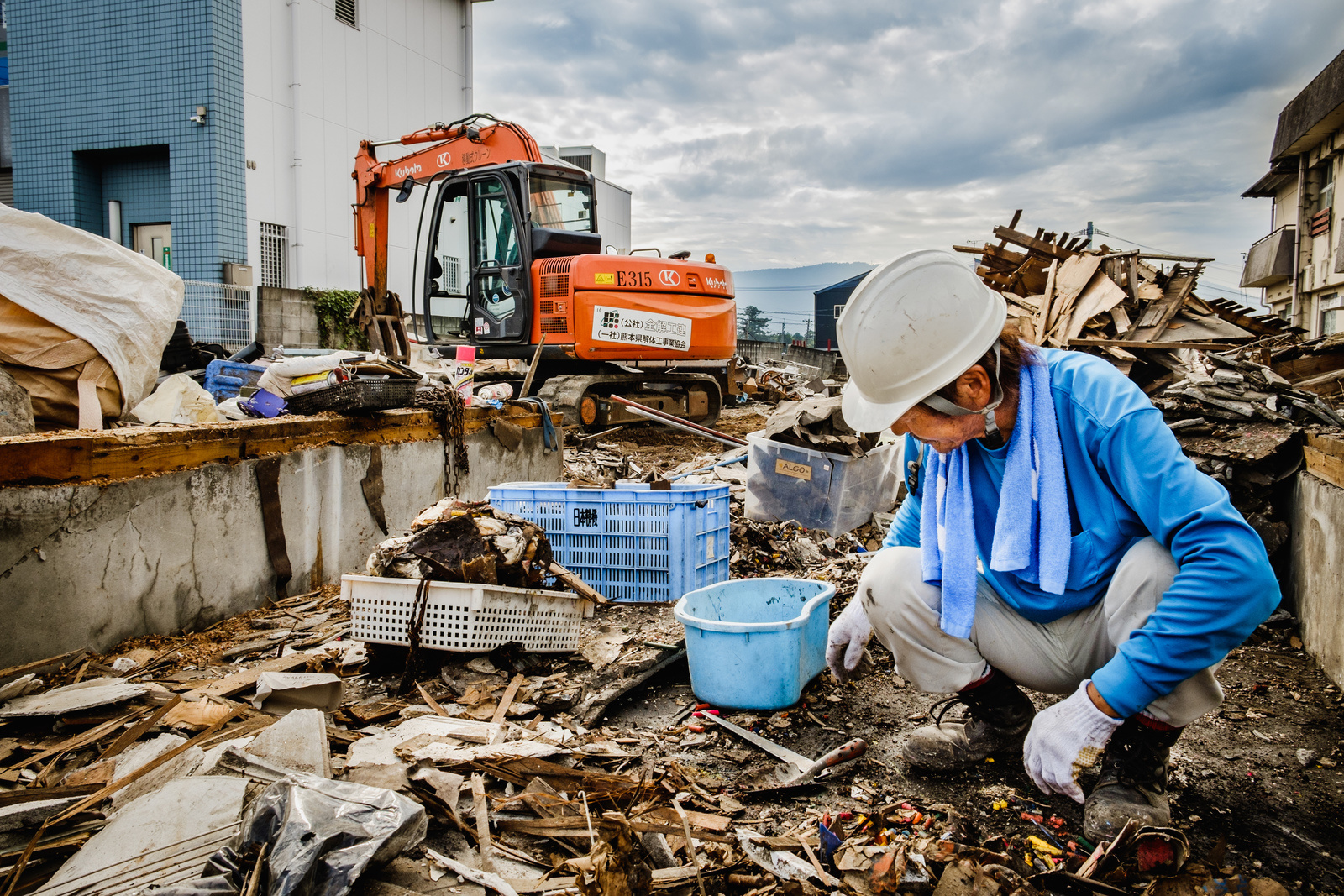
/countries/nepal/dsc_1938.jpg?sfvrsn=9fdcd360_4)

